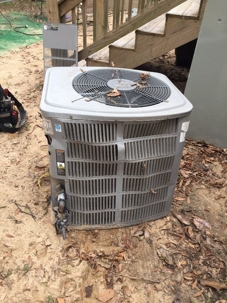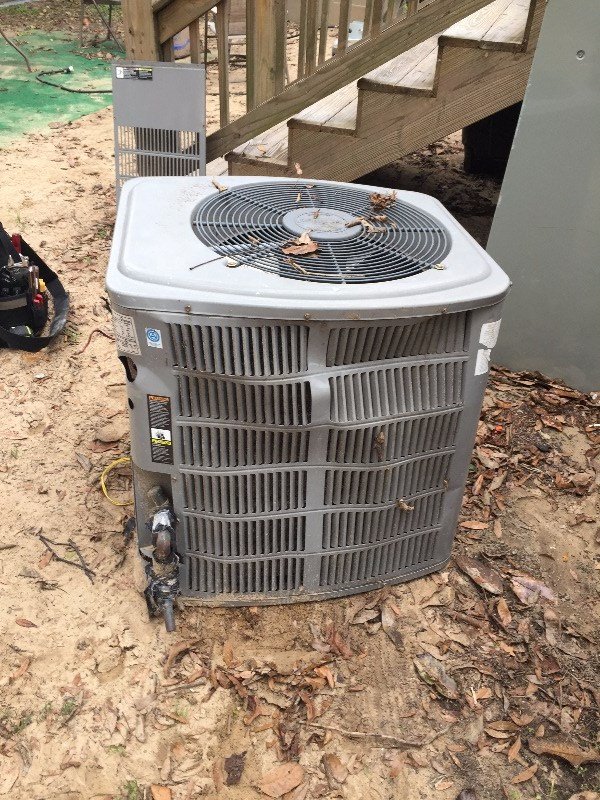There’s a price to living in paradise. Here in Florida, that “price” is the threat of an occasional hurricane.
Our hearts go out to all of those on the West Coast who lost family members, businesses, and homes, and whose lives are forever changed by the force of nature. While the damage here in Central Florida was not as bad as it was in the Sanibel, Fort Myers, Pine Island area, we were affected, too.
You may have had some flooding and flying debris. If so, you need to make sure that your air conditioner is damage-free and safe from long-term complications of storm damage.
Here’s how you make sure your air conditioner is safe to use after a hurricane.
First things first: Inspect the outside unit
Much of what makes your air conditioner function is in the metal box-like structure outside your home. This is where the compressor, condenser, motor, and fan are located. These parts work their magic by pulling the heat and moisture out of the air and then cooling it before pushing it back into your home for you to enjoy.
In Florida, we have extremely strict building codes, and air conditioning equipment is required to be fastened securely to ground pads or rooftops. Not only does it have to be able to withstand wind pressure, but it must be able to withstand 3-second gusts of wind up to 165 mph.
Most outside air conditioning units weigh about 150-200 pounds, but even weighing that much, they can still be moved by falling debris or pushed by flood waters during a massive storm.
Flying debris, like small metal or aluminum pieces of siding or signage can strike your outside unit, and standing water is also an issue during and after a hurricane.
Check these things to make sure your air conditioner is safe to use.
The position of your outside unit:
One of the most common occurrences after a hurricane is that your unit has been pushed off its pad. Of course, the distance it has moved depends on the size of the object that has hit it, the weight of the water that has pushed it, or the speed the object that hit it was going when it impacted it.
Movement of an outside air conditioning unit has consequences. Often, whatever has pushed your unit out of position has also damaged the electrical whip and the disconnect. The shifting could also have ruptured the refrigerant line, a problem that requires immediate attention since refrigerants can be detrimental to the environment if not properly contained.
Hopefully, if your unit was displaced, it was simply moved from its ground position, a problem that can easily be repaired. If, however, you had a rooftop unit that was blown off a roof by a gust of wind, falling debris, or a crashing wave, you will probably need a replacement.
The amount of debris captured in your condenser
Hellacious hurricane winds drive debris into the grille of your air conditioner. Sand, bits of vegetation, sticks, and small metal bits can stick to the condenser, making it difficult for the condenser to circulate the air. A clogged condenser can lower efficiency and decrease the ability of your air conditioner to cool the air.
Luckily, condensers can be cleaned, and if that’s the only damage your air conditioner suffered, consider yourself lucky.
The shape of your air conditioner’s coil fins
If any flying debris has impacted your air conditioner, you might see flattened, bent, or broken coil fins.
Damaged coil fins cause problems because they obstruct air flow, reducing the ability of your ac to keep your house cool. If multiple coil fins are damaged, they could also have damaged a refrigerant line and may even inhibit the motor and/or fan blades.
If you have only minor damage to your coil fins, we may be able to “comb” them, a process that straightens the damaged fins and allows for airflow. If combing isn’t an option, we can often replace the condenser and/or fins instead of the whole unit.
The obvious signs of damage
No doubt, you’ll know if a huge tree has fallen on your air conditioner that it’s suffered severe damage. But even smaller dents, slices, or crushed areas can indicate damage to the internal components.
If you see big dents, call us before trying to turn on your system, and we’ll help you assess your next steps.
The amount of standing water
Most air conditioners can stand a small amount of pooling around an outside unit.
The problem comes when the unit is standing in water. The higher the water, the more damage results because water seeps into the electrical systems, causing short circuits.
Your air conditioner may escape major damage if the water rose around it, but quickly receded. It depends on the depth of the water and the length of time your unit was surrounded or submerged.
If your unit was inundated with flood water, call us for an inspection to rule out electrical damage and prevent future corrosion.
What to do when you come inside
Test the electrical power
After your inspection outside, come inside. Turn on your air conditioner.
Does it come on?
If so, that’s a step in the right direction!
If not, check your electrical panel box. During storms, there are often power surges which may have flipped the breaker. Flip the breaker back on and try again.
If your unit still won’t power up. It’s time to call us. It’s possible that a power surge has fried a capacitor, blown a fuse, or shorted out the compressor.
Use your senses
When your air conditioner comes back on for the first time after a hurricane, make sure it’s safe by using your senses.
Are there any odd smells? Do you detect the smell of burning wire? If your nose picks up any scent of heat or burning, call us. This smell suggests electrical problems that are potentially dangerous to your home.
Listen closely. Are there any unusual noises? Frequently after storms, you will hear rattling or banging sounds. Typically, this is caused by debris that has gotten trapped in the condenser. Large particles can cause further damage to the coils and the inner parts of your air conditioner, so if the noise persists for more than 30 seconds, turn off the air conditioner and give us a call.
Safety. Service. Compassion.
ServiceOne cares about your safety and the health of our community. We’re here to serve you through every season, through good times and difficult times, with both compassion and professionalism.
Call us.


